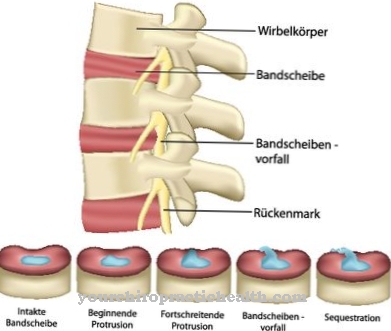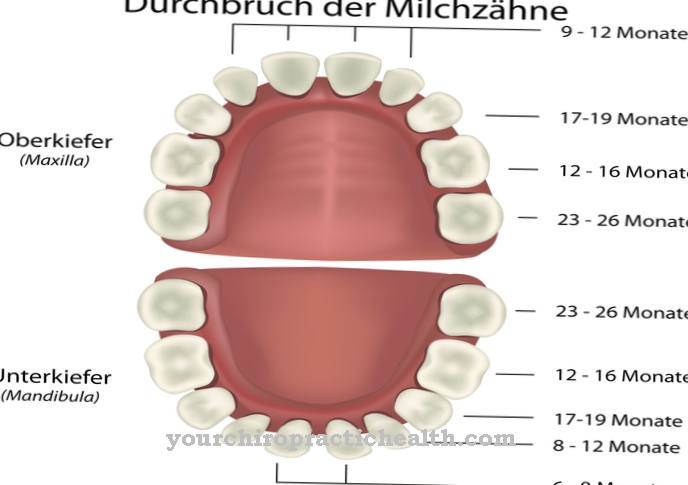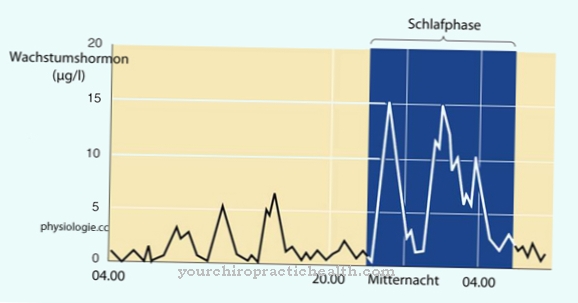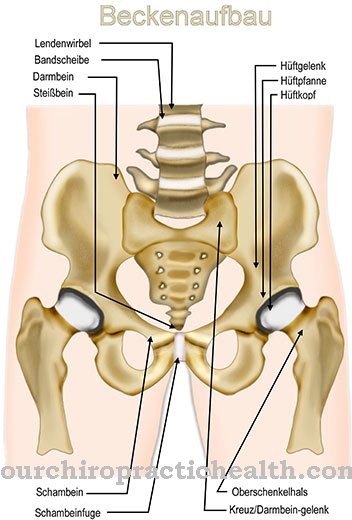The Myoglobinuria represents an increased concentration of myoglobin in the urine and is a characteristic parameter for myoglobinemia. Severely increased myoglobin concentrations in the urine can damage the kidneys. Myoglobinuria is caused by the increased breakdown of muscle cells as part of various diseases.
What is myoglobinuria?

© Henrik Dolle - stock.adobe.com
The term myoglobinuria denotes an increased concentration of myoglobin in the urine. Myoglobin is a globin which, similar to hemoglobin in the blood, is responsible for the transport of oxygen within the muscle cells. Structurally, it also resembles hemoglobin. It takes over the oxygen in the hemoglobin from the blood and transports it to the mitochondria inside the muscle cell.
Combustion processes for energy generation then take place there with the aid of the released oxygen. Myoglobin is a single-chain protein that consists of 153 amino acids. Due to its structure, like hemoglobin, it has the ability to reversibly bind oxygen and release it again. Its molecular mass is quite small at 17,053 Daltons, so when released it can be easily excreted through the kidneys.
Myoglobin is only found in the skeletal and cardiac muscle cells of mammals. When muscle cells break down, it is released and can lead to myoglobinemia (increased levels of myoglobin in the blood) and myoglobinuria. The breakdown of the heart and skeletal muscles is also known as rhabdomyolysis. Rhabdomyolysis can have various causes. The resulting greatly increased concentration of myoglobin in the urine can damage the kidneys and must therefore be treated.
causes
As already mentioned, the cause of myoglobinuria is the increased breakdown of muscle cells, whereby the single-chain protein molecules first enter the blood and from there into the urine. The muscle breakdown or rhabdomyolysis can in turn have various causes. A distinction is made between traumatic and non-traumatic reasons.
Muscle injuries that are caused by external influences are considered traumatic causes. Muscle fibers injured in an accident can dissolve and trigger what is known as Cush's syndrome. In the context of Cush's syndrome, the myoglobin levels in the blood and urine rise so much that liver and kidney failure can occur.
Injuries and disintegration of muscle cells can also occur after electric shocks, seizures, operations, with high pressure on the muscles or when lying down for a long time. The non-traumatic causes of muscle breakdown include heart attacks, certain viral infections, electrolyte disorders, hyperthermia, excessive alcohol, intoxication with medication and drugs.
Also muscle inflammation, autoimmune diseases, metabolic diseases, hormone disorders, blood diseases and snake or mushroom poisoning. The most dangerous complication of rhabdomyolysis and the resulting myoglobinuria is kidney failure.
Myoglobin can cause kidney damage in three ways. The heme can form urine sediments and block the kidney tubules. Furthermore, damage to the tubular cells from released iron is possible. Ultimately, the shift in fluid into the damaged muscle leads to reduced blood flow to the kidneys.
You can find your medication here
➔ Medicines for muscle painDiseases with this symptom
- Liver failure
- Drug addiction
- Heart attack
- Metabolic disorder
- Kidney weakness
- Alcohol addiction
- poisoning
- Hormonal imbalances
- Heart attack
- Electrolyte disorder
- Muscle inflammation
- Autoimmune disease
Diagnosis & course
Myoglobinuria is a symptom of an underlying breakdown of the striated muscles. It is a sensitive indicator of myoglobinemia. It can be recognized by the red-brown discoloration of the urine. In severe cases, myoglobinuria can be the starting point for extensive kidney damage.
This applies, among other things, to the so-called Cush syndrome. Cush syndrome is caused by a severe injury to the skeletal muscles in an accident. This leads to the death of the muscle cells, which results in both myoglobinemia and myoglobinuria. In Cush syndrome there is fulminant kidney and liver failure.
It is also referred to as the so-called Cush kidney. The kidney tissue perishes through necrotic processes. Without treatment, the extremely serious complication can quickly lead to death. Long-term kidney damage can occur even with milder forms of myoglobinuria. Therefore, the concentration of myoglobin in the urine should be reduced as part of therapy.
Laboratory tests of the urine and blood are carried out to diagnose myoglobinuria. The urine turns reddish brown. The underlying rhabdomyolysis is determined by increased levels of creatine kinase (CK) and lactate dehydrogenase (LDH) in the blood. In addition, increased concentrations of myoglobin are also measured in the blood.
When should you go to the doctor?
Myoglobinuria must be examined and treated by a doctor. In the worst case scenario, if treatment is not received, the kidneys can be damaged. This damage is usually irreversible and the person concerned then has to rely on dialysis or a donor organ in order to survive.
The symptoms of myoglobinuria are visible through red colored urine. In the event of this complaint, a doctor must be consulted in any case. Damage to the affected person's skeleton, especially after an accident, can result in myoglobinuria. If the patient has previously suffered an accident, medical treatment is also necessary. Most of the time, this also leads to a fever and a general feeling of illness in the patient. If there are still problems with the liver, the disease may be more advanced. In this case, urgent treatment by a doctor is necessary.
Doctors & therapists in your area
Treatment & Therapy
There is no other causal therapy for myoglobinuria. So it is always tried to prevent the triggering factors for muscle dissolution. However, to prevent kidney damage, steps must be taken to reduce the concentration of myoglobin in the urine. This can be achieved with forced diuresis.
With diuresis, the urine excretion through the kidneys is increased. For this purpose, diuretics are administered, among other things. The patient is given infusions that contain so-called loop diuretics. Loop diuretics are diuretic drugs that work directly on Henle's loop of the kidneys.
They ensure the accelerated excretion and dilution of myoglobin in the urine. To prevent the myoglobin from precipitating, the urine is also made alkaline. In very severe cases, the blood must be cleaned of myoglobin by dialysis.
Outlook & forecast
The untreated myoglobinuria can cause severe damage to the kidneys. As a rule, these are not reversible, so that serious complications can arise for the patient. There is also severe injury or damage to the skeletal muscles through the breakdown of muscles.
In some cases, myoglobinuria can also affect and damage the liver. The kidney complications can, in the worst case, lead to death if no treatment is given. Medicines are usually used to treat kidney disease and to stop muscle breakdown.
Since the causes of myoglobinuria are relatively diverse, no general prognosis about the success of this disease can be given. If it has come about through excessive consumption of alcohol or other drugs, the addictive substances must be discontinued or withdrawal must be carried out.
In many cases, myoglobinuria also leads to inflammation of the muscles and metabolic diseases.
You can find your medication here
➔ Medicines for muscle painprevention
Since myoglobinuria can be caused by a variety of causes, there are no general recommendations for its prevention. However, a healthy lifestyle can reduce the risk of disease. This includes avoiding excessive use of medication, drugs or alcohol. But strengthening the immune system also helps to lower the risk of causative infectious diseases.
You can do that yourself
In any case, myoglobinuria should first be evaluated medically. In addition to medical treatment, the complaints and symptoms can be treated with various home remedies and self-help tips.
In addition to medical diuresis, diuretic preparations and plants can be taken to regulate the myoglobin concentration in the urine. The dandelion and burdock root are said to have a diuretic effect. Both plants can be taken as tea or in the form of appropriate supplements, after consulting a doctor, and help relieve myoglobinuria.
Once myoglobin levels have been successfully regulated, preventative measures must be taken. A healthy lifestyle and the avoidance of stimulants as well as medication and drugs significantly reduce the risk of illness. In general, the immune system should be strengthened so that triggering infectious diseases cannot develop in the first place.
If myoglobinuria occurs again, you must speak to your family doctor. There may be an underlying disease or a previously unknown trigger that needs to be diagnosed quickly and, if necessary, treated. Early medical clarification can reliably prevent myoglobinuria from progressing.




























